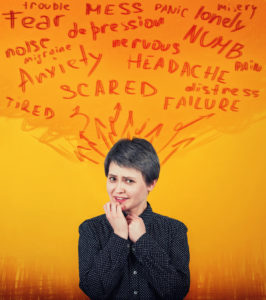How you speak determines how you are heard. Get out of your own head and think about how your words will land on the ears of your audience, because how you intend to be heard is irrelevant. How you are actually heard determines how you will be taken by the listener.

Any population of people will exhibit a spectrum of behaviors, from passive to aggressive, obsessive to indifferent, or mentally and emotionally strong to those who can have trouble with those issues.
For those folks who do struggle emotionally and mentally, obviously they need to seek some form of help. But how you talk about it with them will determine how likely they are to accept the mental health benefits they can get.
For example, if you talk about this as a mental health issue, they may hear it in a completely negative way: not clinically, but as an indication that they may reside in downtown crazy town. This perception can prevent them from reaching out to receive the help they need.

To avoid this, we need to speak about mental health in a way that overcomes such a psychological barrier. One solution is to change the term “mental health” to “brain health”. This one change transforms the meaning from an issue about psychology to plain physiology.
In other words, the issue becomes about some body part (your brain) instead of about the essence of who you are (your mind). Many people have issues with organs of their body: heart issues, concerns about the prostate, liver health, kidney function.
The brain is just another organ in their body that needs tending like any other. Employees can hear that this is not an indictment of their mental state or an indication that they are nuts. This communication can allow them to be less self-conscious about utilizing the services.
Relabeling the issue in a healthier way is one step, but this also needs to be applied to brain health conditions as well.
When talking about something like Seasonal Affective Disorder, if you say that this is a time where people get SAD each winter, many will hear that they just need to buck up, or think positive, or don’t be such a wuss, or just play Bobby McFerrin’s “Don’t Worry Be Happy” song morning, noon, and night. This person thinks it’s their own fault somehow.
By contrast, speak about the very same condition as a simple function of your brain. The brain is affected by the amount of sunlight it gets in a day. Just as sunlight affects the skin by producing vitamin D, it also contributes to positive neurohormonnes in your brain based on the amount of light received.
In other words, Seasonal Affective Disorder is a brain state, not a mental state.
Similarly, when talking about bi-polar disorder, speak about it as a condition that the brain settles into. Emotions may be driven by us, but they are also created by our brain. In other words, sometimes we drive the emotions, and other times they drive us. Thinking about it in this way can help remove the feeling that emotional swings are about what you’re doing (oh, you’re just being emotional right now), to something that is happening to you. It can also help remove the stigma surrounding the condition, and create permission to engage in the benefits of treatment.
By understanding how words are heard, we can target our messaging to be more effective. The end result will be greater utilization of the services, and improved health in the process.




